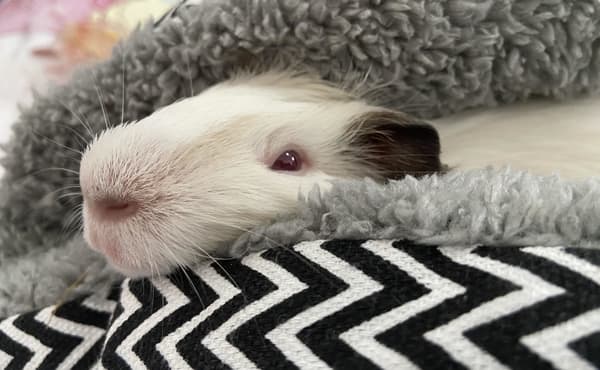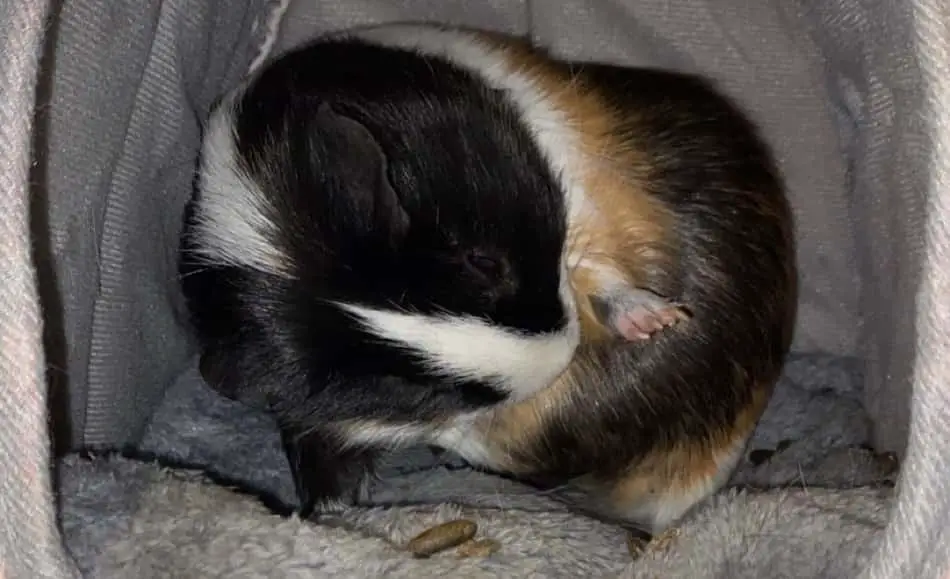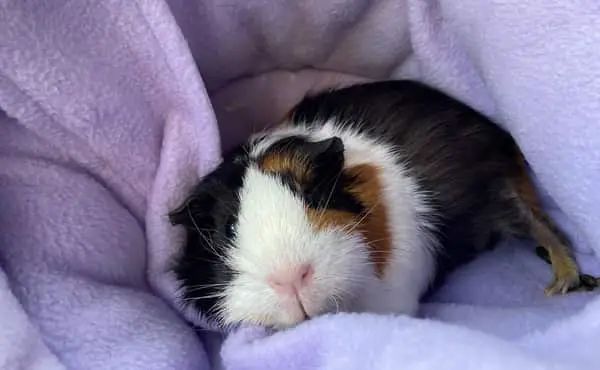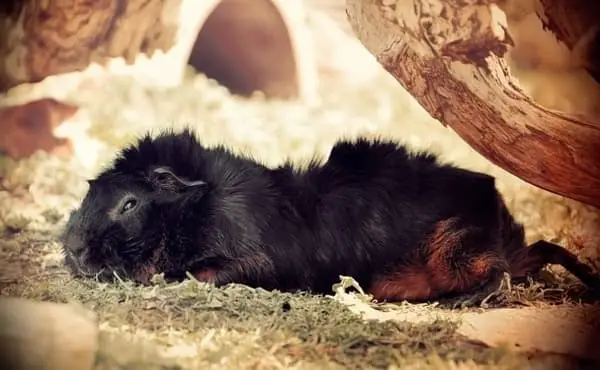Guinea pigs have limited options for grooming themselves and dealing with pain and stress. This sometimes involves chewing on themselves or objects surrounding them. While it can certainly be alarming to find your guinea pig chewing on its own feet, there is almost always a logical explanation behind this behavior.
So, why do my guinea pigs bite their feet? Licking and nibbling the nails and feet is a normal part of a guinea pig’s self-grooming routine. However, when they are stressed or bored, guinea pigs may take things a bit too far and barber the fur around their feet. Pain or itching can also cause a guinea pig to bite at its feet.
This article will thoroughly explore the various reasons you may find your guinea pig biting its feet. We’ll explain the reasons behind natural foot and nail grooming. Then we’ll delve into more problematic issues that could be causing your guinea pig to overgroom or even injure its feet and discuss how to address these issues.
Natural Grooming vs. Barbering
Guinea pigs prefer to be tidy and will regularly groom their entire bodies, including their feet. This may include nibbling at the fur of their feet, their nails, and between their toes. Self-grooming may last for a few seconds to a few minutes and often takes place after eating, after sleeping, after being held, and at various times through the day.
You may notice that your guinea pig licks and bites its toes and nails while grooming or after scratching behind its ears. It may even chew off its nails a bit if they are overgrown. Natural grooming like this is unproblematic and shouldn’t cause any injuries to your guinea pig’s feet.
Guinea Pig Barbering
Occasionally, guinea pigs will get carried away with their grooming and chew away the fur around their feet or on another area of their bodies, causing thin or bald spots. This is called barbering, and there are various reasons behind it.
It can be the result of stress or boredom. It can also be a reaction to discomfort like pain, itching, or irritated skin—issues we’ll discuss in more detail later on.
Barbering of Other Pigs
If you have more than one guinea pig, you should be aware that guinea pigs may occasionally barber one another. You may need to watch their interactions for a while to determine who is doing the barbering. Barbering between guinea pigs often has to do with dominance and won’t be covered in this article.
Barbering Due to Stress or Boredom
If your guinea pig is chewing the fur away from its own feet, you may look for other signs that your guinea pig is uncomfortable, stressed, or bored. Other symptoms of stress and/or boredom include:
- Chewing cage bars
- Chewing or playing with water bottle
- Change in appetite and/or behavior
- Hunched position or constant hiding
- Lethargy or disinterest
- Pacing or circling
How to Address Barbering
It’s always best to check with your vet first to make sure that barbering is not the result of any kind of health issue before deciding that this behavior is entirely due to stress or boredom. Once health issues have been ruled out, you can begin searching for underlying factors.
Barbering Due to Stress
In order to stop barbering due to stress, you’ll need to figure out what is causing your guinea pig’s anxiety so that you can remove it or gradually desensitize your pet to it. Stress could be caused by a multitude of problems, including:
- Incompatibility with another guinea pig
- Lack of hiding places
- Loud noises or too much activity around the cage
- Recent changes in environment
- Inadequate cage size

Barbering Due to Boredom
If you determine that your guinea pig’s barbering could be due to boredom, there are plenty of ways to alleviate this. Guinea pigs enjoy tunnels and toys they can chew on. You can also create foraging opportunities by hiding treats inside of toys or crumpled balls of paper.
Remember that guinea pigs are curious and social animals and make sure to spend enough time interacting with them that they won’t get lonely. Guinea pigs especially enjoy being allowed some supervised out-of-the cage exploring opportunities. You can also play gentle games with your guinea pig, set up simple mazes, or hide treats for them to find.
Pain or Discomfort
As we have mentioned, chewing and biting at their feet could indicate that a guinea pig is suffering from a pain, infection, or skin irritation. Although you should always check with your vet, it’s helpful to be informed of some of the most common health issues that could be causing your guinea pig to bite its feet, so we’ll include a brief overview here.
Bumblefoot
Bumblefoot is a bacterial infection that affects the pads of a guinea pig’s feet. It generally starts with small cuts or scrapes on the bottom of a guinea pig’s feet that become infected. Underlying causes can be too much time spent on a wire cage floor, damp or dirty bedding, lack of mobility, and inadequate nutrition. Along with foot biting, symptoms of bumblefoot include the following.
- Inflammation of the pads of the feet
- Sores on feet
- Hair loss on infected feet
- Swelling of joints
- Loss of appetite
- Reluctance to walk
- Change in gait, limping or dragging feet
Treating Bumblefoot
Bumblefoot is a very painful condition that should be addressed as soon as possible. If left untreated, it can progress to the point where a guinea pig may even have to have the affected limb amputated.
If caught early enough, however, it is a fairly simple disease to address. Treatment usually includes lifestyle and habitat changes, antibacterial foot soaks, and an antibiotic if the disease has progressed far enough.
How to Avoid Bumblefoot
Here’s the good news if your guinea pig does not already have bumblefoot. With proper care, this infection can be avoided entirely. Here are some tips on caring for your guinea pig in a way that will keep it from developing this painful disease and support its recovery if it already suffers from it.
- Keep your guinea pig in a cage with a smooth floor rather than a wire floor.
- Keep the cage clean and dry.
- Use a soft, non-irritating bedding.
- Make sure your guinea pig has plenty of room to move around.
- Feed a well-balanced, nutritious diet.
- Keep guinea pig’s nails trimmed.
- Consult your vet if your guinea pig is obese or struggles with mobility.
Itching and Skin Irritation
Biting at its feet may also be a sign that your guinea pig is suffering from some other skin irritation or parasites that are causing it pain or discomfort. Besides bumblefoot, some of the most common causes of itchiness and skin irritation in guinea pigs are:
- Mites or lice
- Fungal infections (ringworm)
- Scurvy
- Mange
- Abscesses or cysts
These ailments are often accompanied by symptoms like constant scratching; ragged, thinning, or unkempt fur; lameness, weight loss, and general signs of poor health and discomfort.
Again, the best way to avoid them is to keep your guinea pig in a clean, roomy cage with comfortable bedding and feed a diet that fulfills all of its nutritional requirements. However, if your guinea pig already suffers from any of them, you will also need to consult a vet to get it back on track to health and happiness.
Conclusion
With the information above and a few minutes of close observation, you should quickly be able to get a general idea of whether your guinea pig’s foot biting behavior is normal or due to an underlying issue. Natural grooming behavior will be regular and fairly relaxed. Your guinea pig may bite at its nails, but it won’t cause itself to bleed or chew all of the fur away from its feet.
Serious barbering or any signs of redness, injuries, lameness, scabs, or sores should always precipitate a trip to the vet as leaving an infection untreated can be both painful and dangerous for your pet.
An experienced exotic vet will be able to get your guinea pig back on the road to health and advise you on how to keep it there. You can keep your guinea pig comfortable during recovery and avoid recurrent infections by providing a proper habitat, diet, and bedding and keeping its environment clean and dry.
As stress, loneliness, and boredom can also contribute to unhealthy barbering or foot biting, it’s equally important to provide your guinea pig with enrichment and interact with it regularly. Your pet’s health—both physical and mental—is closely tied to its contentment and happiness, and it is completely dependent on you to provide these things.



